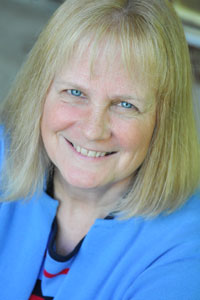by Ellen Munds
 In my early days of fundraising, the idea of asking someone for money made me physically sick. But I also knew that no one was going to do it for me, so I had to learn how. In 1996, I attended a one-week course at the Fund Raising School of Indiana University Center on Philanthropy. That course turned my relationship with fundraising upside down. It is still not my favorite part of my job, but I no longer dread it. These days, I approach fundraising as a personal challenge.
In my early days of fundraising, the idea of asking someone for money made me physically sick. But I also knew that no one was going to do it for me, so I had to learn how. In 1996, I attended a one-week course at the Fund Raising School of Indiana University Center on Philanthropy. That course turned my relationship with fundraising upside down. It is still not my favorite part of my job, but I no longer dread it. These days, I approach fundraising as a personal challenge.
You never know when a donation will drop in your lap. During the first or second year of the existence of Storytelling Arts of Indiana, one of the sound engineers that we had hired wrote us a check for $75.00. He said that we couldn’t cash the check until we started an endowment. We opened a savings account and deposited the check. From that day forward, we offered individuals a choice to make a donation to the general operating fund or the endowment. In 2006, a single young volunteer and attendee called me to ask about making a donation to our endowment in memory of her grandmother. I said, “Of course!” I then asked her if she would like to get together or if she would prefer to drop the donation in the mail. She decided to drop it in the mail. In my mind, I was thinking $100 or maybe $500. I was certainly surprised when I opened the envelope and found a check for $15,000. During the same year, we decided to incorporate the endowment as its own not-for-profit with the sole purpose of funding the programs and services of Storytelling Arts of Indiana. We moved the funds to the Central Indiana Community Foundation so that our money would be managed by experts. To date, our endowment has grown to approximately $100,000, along with nine planned gifts. As far as endowments go, it is still small but, for us, this is a major achievement.
I will be presenting a fundraising workshop at the upcoming NSN Storytelling Conference in Richmond, Virginia. Hopefully, this workshop will help point your organization down the path to financial security. During this three-hour intensive session, which includes lecture, group discussion and small group activities, we will examine your budgets for potential earned and contributed income. We will determine the best approaches for each income source as well as prioritize your next steps in developing a fundraising plan.
I will share with you the tools that I have found to be the most helpful. These tools are the “science” of fundraising. One specific tool demonstrates that it is humanly impossible for one individual to raise all of the necessary funds for an organization, whether large of small. Someone has to lead but it takes a team of volunteers, board members or staff.
My favorite tool is the Gift Range Chart. It takes your goal and breaks it down into manageable goals. If you want to raise $50,000, this tool helps you determine how many gifts of various sizes ($2,500, $1,000, $100, etc.) you will need. It is much easier for me to wrap my head around raising two $2,500 gifts instead of worrying about raising $50,000. You will create a Gift Range Chart for your organization, so bring your budgets.
I am not a fundraising or development expert. I’ve learned from experience, from colleagues who were willing to mentor me along the way and by making my own mistakes. Bring your questions and your own experiences. I am sure we will learn from each other!
About Storytelling Arts of Indiana
Ellen H. Munds
Executive Director
Storytelling Arts of Indiana
www.storytellingarts.org
www.lifestoriesproject.net
Storytelling Arts of Indiana promotes the art and use of storytelling in everyday life. Current programs include:
- the Life Stories Project in collaboration with WFYI and the Indiana Historical Society
- Jabberwocky in collaboration with IndyFringe Festival
- As I Recall storytelling guilds for elders in collaboration with the Indianapolis Public Library and the Hancock County Public Library
- Weekly storytelling at the bedside of patients at Riley Hospital for Children,
- Summer performances in the neighborhood parks for children receiving free lunches in collaboration with Indy Parks,
- If These Walls Could Tell series in collaboration with Indiana Landmarks
- Sharing Hoosier History Through Stories series in collaboration with the Indiana Historical Society
- Frank Basile Emerging Stories Fellowship
- Scary Stories at Crown Hill Cemetery in collaboration with Crown Hill Heritage Foundation
- Series for adults as well as performances for families and students in collaboration with the Indiana Historical Society
